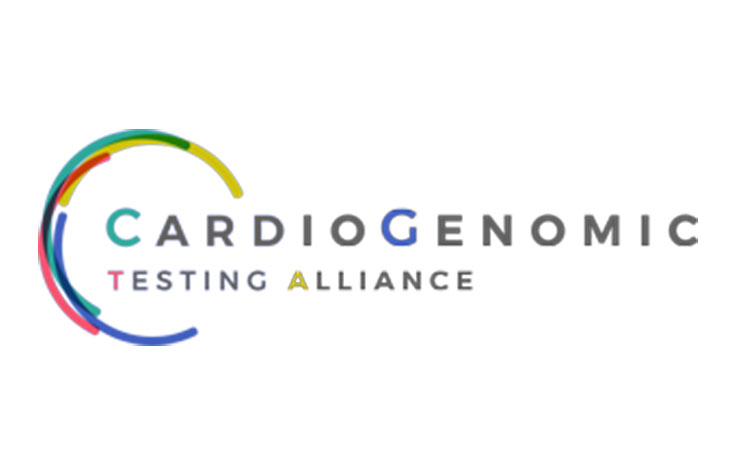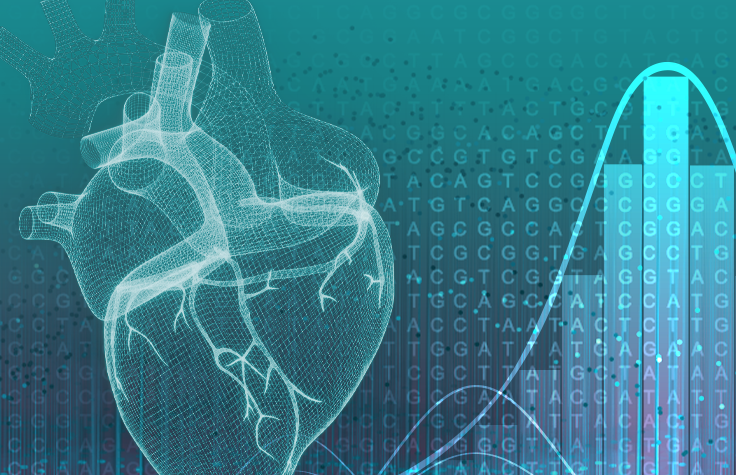Cardiovascular Genetics for Healthcare Providers
Detailing health and cardiovascular genetics
Employing genetics for personalized patient care strategies

How can genetics improve cardiovascular health?
With over 40 inherited cardiovascular diseases, knowing the genetic risks of conditions such as arrhythmias, cardiomyopathies, aortic aneurysms, hypercholesterolemia, and others can improve management and treatment strategies through clinical surveillance.1
Each year, genetic testing is gaining increasing support from professional cardiology societies in the clinical management of individuals and families affected by inherited conditions related to cardiovascular disease.2
Sequencing and cardiovascular health
If you are seeking to learn more about a patient’s genetic predisposition to inherited cardiovascular conditions, genetic testing can be accessed through cardiologists, medical geneticists, genetic counselors, and other healthcare providers. The results of genetic testing can provide diagnostic clarification, inform management and therapeutic action in affected persons and at-risk family members, and guide further clinical surveillance in family members found to carry a familial disease-causing gene variant.2 The following table provides featured vascular and heart related conditions and the potential benefits of genetic testing to improve diagnosis and treatment options.
| Featured condition | Role of genetic testing in diagnosis | Role of genetic testing in treatment |
|---|---|---|
| Long QT syndrome |
|
Gene variant-specific therapeutic management has been implemented with the recommendation of preventative beta-blockers, oral potassium, sodium current blockers, or a surgical intervention like left cardiac sympathetic denervation.2 |
| Hypertrophic cardiomyopathy |
|
Results of genetic testing may alter medical management and may prompt consideration of experimental treatments for certain types of variants.3 |
| Familial aortic aneurysm and dissection |
|
Affect the timing of recommended surgical intervention, the extent of timing of screening for other abnormalities, and identify at-risk family members.3 |
| Familial hypercholesterolemia |
|
Affect the use and choice of lipid-lowering therapies.3 Allow for the initiation of therapies at earlier ages, and more accurate risk stratification.3 |
Additional advantages of genetic testing
Preventative measures
Identifying at-risk individuals is important for their medical care.2 Family testing, or cascade testing, can identify at-risk persons to better inform their medical management.4
Pharmacogenomics
Pharmacogenomics enables personalized therapies by studying how variations in the human genome affects a person’s response to medications. Explore how sequencing can hone precision medicine.

The value of whole-genome sequencing
Whole-genome sequencing (WGS) powered by next-generation sequencing (NGS) is driving breakthroughs in genetic disease testing to link genetic variants with disease. This work is helping to improve early detection and treatment options for better outcomes. Many genetic variants have been discovered to be linked to heart disease, and that list continues to grow. WGS can help diagnose in days what previously took months or even years to find out, allowing providers to shorten the diagnostic odyssey for patients with these conditions.
WGS also allows for a more comprehensive understanding of cardiovascular disease with each new gene association discovery. Additionally, WGS enables layered technological innovations such as a polygenic risk score (PRS) to better predict susceptibility to heritable diseases.
The growing healthcare awareness of genetic testing
Genetic testing can make a substantial difference for individuals with inherited cardiac conditions. Several professional medical societies have made recommendations on genetic testing for cardiovascular related conditions.*
European Heart Rhythm Association (EHRA)/Heart Rhythm Society (HRS)/Asia Pacific Heart Rhythm Society (APHRS)/Latin American Heart Rhythm Society (LAHRS) consensus statement
This statement discusses the diagnostic, prognostic, and therapeutic implications of genetic testing for inherited arrhythmia syndromes, cardiomyopathies, sudden cardiac death, congenital heart disease, coronary artery disease, and heart failure.
American Heart Association (AHA) scientific statement
Read the statement from the AHA summarizing the best practices with respect to genetic testing and its implications for the management of inherited cardiovascular diseases, including cardiomyopathies, arrhythmic disorders, thoracic aortic aneurysms and dissections, and familial hypercholesterolemia.
*This is not a comprehensive list of all statements and guidelines released by organizations.

Cardiogenomic Testing Alliance
Illumina is a founding member of the CardioGenomic Testing Alliance (CGTA), which is a group of companies and labs working together to raise awareness about the best uses of genetic testing for heart diseases.
Learn moreTHOUGHT LEADERSHIP
Featured cardiovascular disease experts

Improving cardiovascular therapies through pharmacogenomics
Pharmacogenomics can reveal how a patient responds to drugs and serve as a tool to identify efficacy. In this interview, Dr. Marie-Pierre Dubé, PhD discusses clinical research that identified genotypes of cholesterol drug responders and nonresponders using Illumina technologies.

Can genetic testing improve cardiovascular outcomes?
In this webinar, Dr. Joshua Knowles discusses the importance of genetic cascade testing in familial hypercholesteremia, as well as implementing polygenic risk scores in clinical care.

Frontiers in clinical genetics in cardiovascular prevention
The American Society for Preventive Cardiology (ASPC), in collaboration with CardioNerds, launched a podcast series through educational sponsorship from Illumina. The goal is to highlight the role that genetics and genomics ultimately can play in the management and prevention of cardiovascular disease.
Learn more

Cardiovascular disease research
Stay on the cutting edge of cardiovascular disease research. Explore various solutions and methods that can accelerate discoveries.

Cardiovascular genomics overview
See the compelling case for genetic sequencing to improve our understanding of cardiovascular related diseases.

Is heart disease genetic?
Learn how genetic testing can help diagnosis, management, and treatment options.
Related content
Precision genomics
Genomics-powered precision medicine can help identify disease-associated variants, pinpoint the underlying genetic causes of diseases, and optimize management and treatments.
Polygenic risk scores
These scores represent the number of genetic variants an individual has that increase their risk of developing a particular disease. Explore key considerations and future uses.
References
- Semsarian C, Ingles J, Ross SB, Dunwoodie SL, et al. Precision Medicine in Cardiovascular Disease: Genetics and Impact on Phenotypes: JACC Focus Seminar 1/5. J Am Coll Cardiol. 2021;77(20):2517-2530. doi:10.1016/j.jacc.2020.12.071
- Wilde AAM, Semsarian C, Márquez MF, et al. European Heart Rhythm Association (EHRA)/Heart Rhythm Society (HRS)/Asia Pacific Heart Rhythm Society (APHRS)/Latin American Heart Rhythm Society (LAHRS) Expert Consensus Statement on the state of genetic testing for cardiac diseases. J Arrhythm. 2022;38(4):491-553. Published 2022 May 31. doi:10.1002/joa3.12717
- Musunuru K, Hershberger RE, Day SM, et al. Genetic Testing for Inherited Cardiovascular Diseases: A Scientific Statement From the American Heart Association. Circ Genom Precis Med. 2020;13(4):e000067. doi:10.1161/HCG.0000000000000067
- Stiles MK, Wilde AAM, Abrams DJ, et al. 2020 APHRS/HRS expert consensus statement on the investigation of decedents with sudden unexplained death and patients with sudden cardiac arrest, and of their families. J Arrhythm. 2021;37(3):481-534. Published 2021 Apr 8. doi:10.1002/joa3.12449